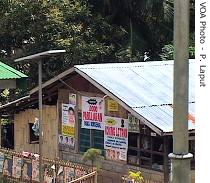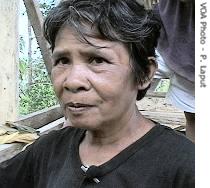2007年VOA标准英语-Poverty Undermines Solar Power Project for Remo
搜索关注在线英语听力室公众号:tingroom,领取免费英语资料大礼包。
(单词翻译)
By Heda BayronZamboanga del Norte, Philippines
16 July 2007
Electricity has yet to reach hundreds of far-flung villages in the Philippines. But a solar energy system project for the country's remote villages is facing problems because of poverty. Prospero Laput visited the village of Patagan in the southern Philippines, and has this report brought to us by VOA's Heda Bayron.

House with solar panel unit in Patagan
The road to Patagan village is a narrow dirt path cleared out of the thick jungle. When it rains, it is a mud pit. There are no buses here. Villagers either walk several kilometers to town or travel on motorcycles, or horseback.
Patagan is so remote that power lines cannot reach the area. Until three years ago, the village's 1,100 residents did not have electricity.
The villagers cheered when, in 2004, Philippine President Gloria Arroyo1 came all the way from Manila to hand over a solar energy system.
Households were given solar panels that absorb sunlight and convert it into electricity. Each unit generates enough electricity to light up fluorescent2 bulbs.
The project is part of a nationwide program co-funded by Spain to bring power to nearly half a million people.
It seems to have come at the right time. Oil prices are high, and the Philippines' location close to the equator means there is plenty of sunshine all year round.
 |
| Village chief Benjamin Baynosa |
Joelita Limbaga, a government officer who monitors the project, says children now study more, livelihood4 has improved, and villagers can do some work at night.
But while the solar panels changed village life for the better, the residents say they cannot pay for the system's upkeep. Recipients5 have to pay $3.70 cents monthly to a maintenance fund.
Villagers say that is more expensive than their $2 monthly budget for kerosene for lamps.
Most of the villagers are farmers. They earn about a dollar a day, mostly from selling coconut6 products and bananas.
 |
| Housewife in Patagan says the solar power maintenance fee is too expensive |
Some families have already given their panels to neighbors because they cannot afford the fee.
With the solar project, the government hoped to stimulate7 farm productivity in the country's poorest areas. If harnessed effectively, solar energy could power water pumps for irrigation, hatcheries and incubators for agribusiness activities.
But the economic benefits have yet to be felt by Patagan residents. A recently constructed public market is empty and used by children as shelter from the heat.
Without the solar panels, the village would have to wait much longer for electricity. Government efforts to connect the area to power grids8 have been hampered9 by Patagan's inaccessibility10 and the limited potential for a return on investment. The villagers say electricity remains11 a luxury.
 收听单词发音
收听单词发音 




